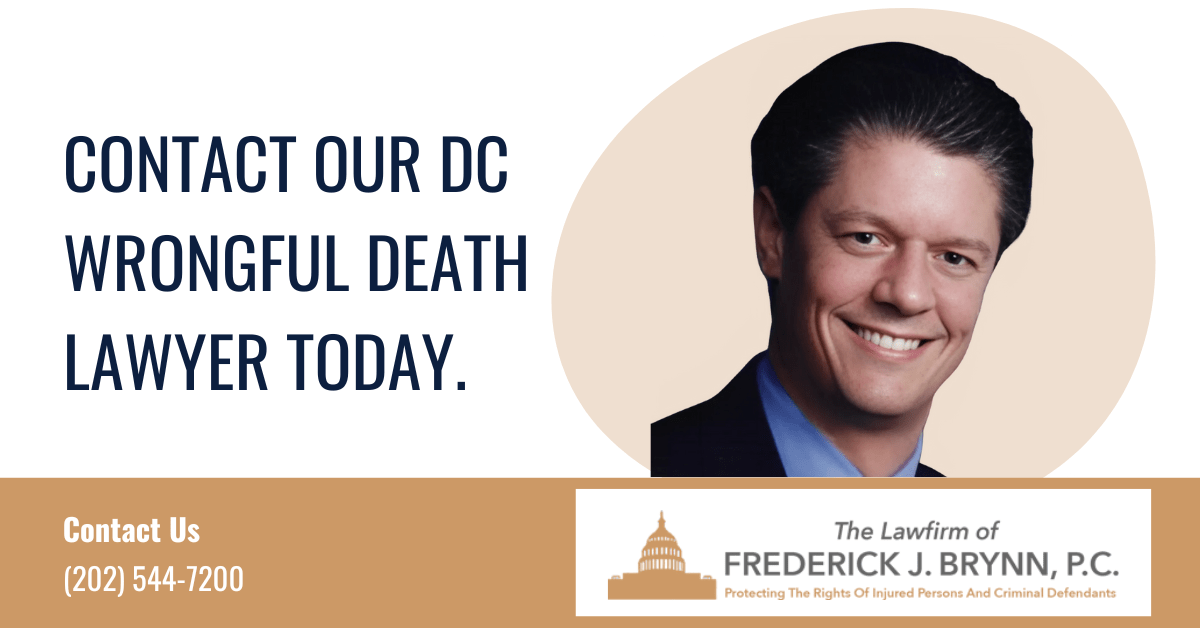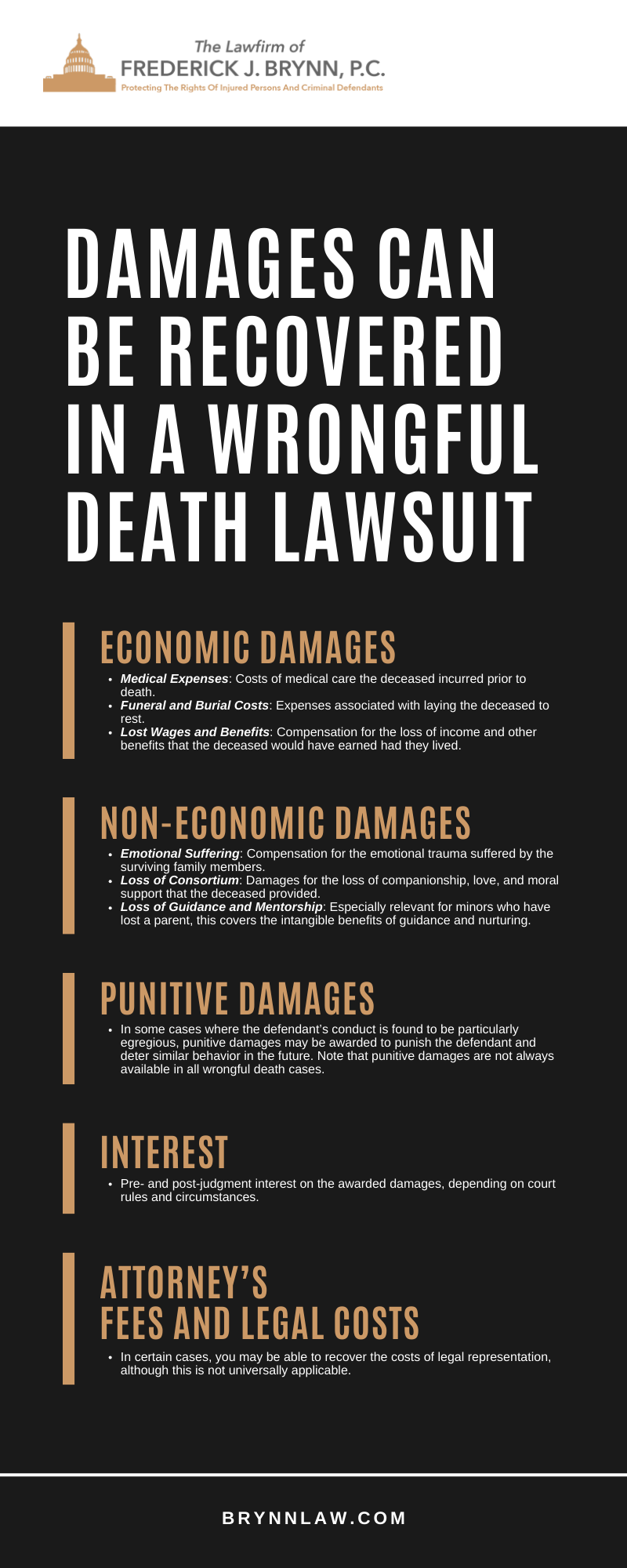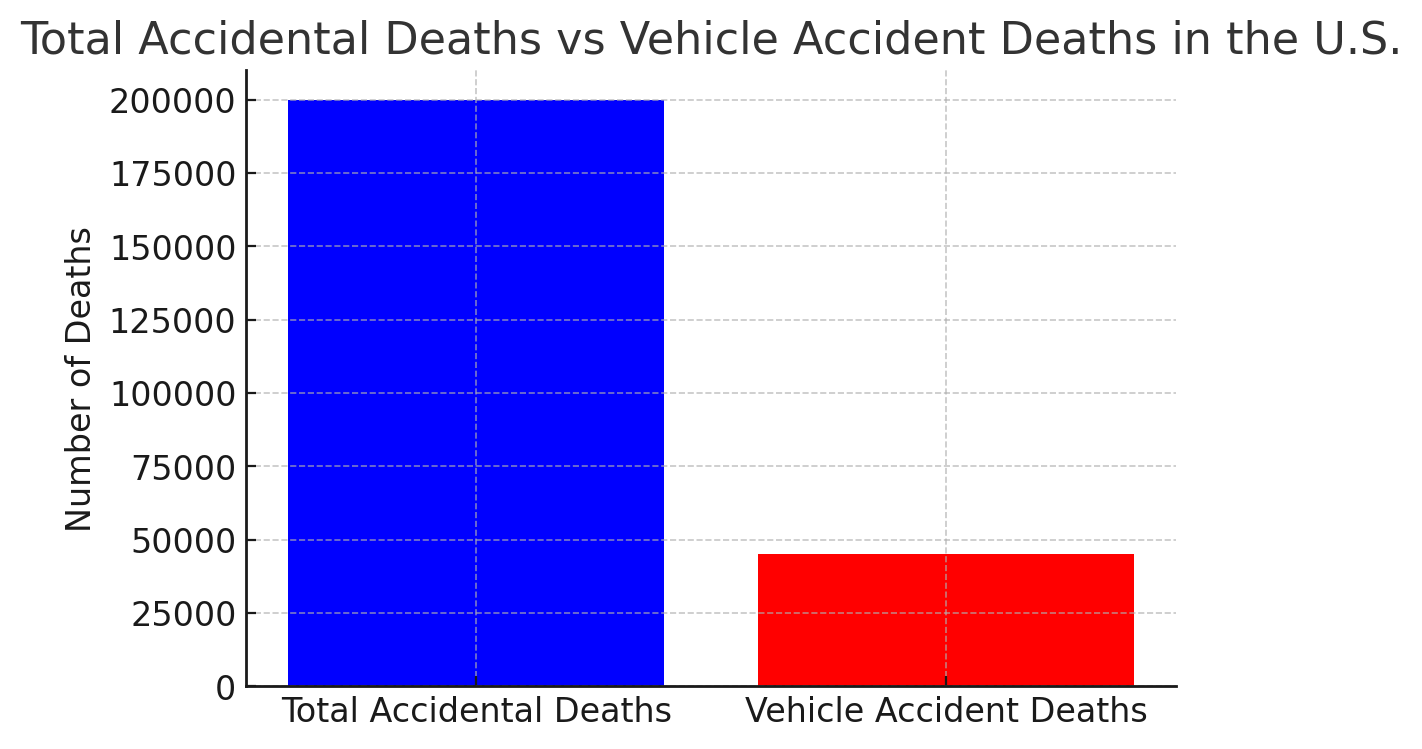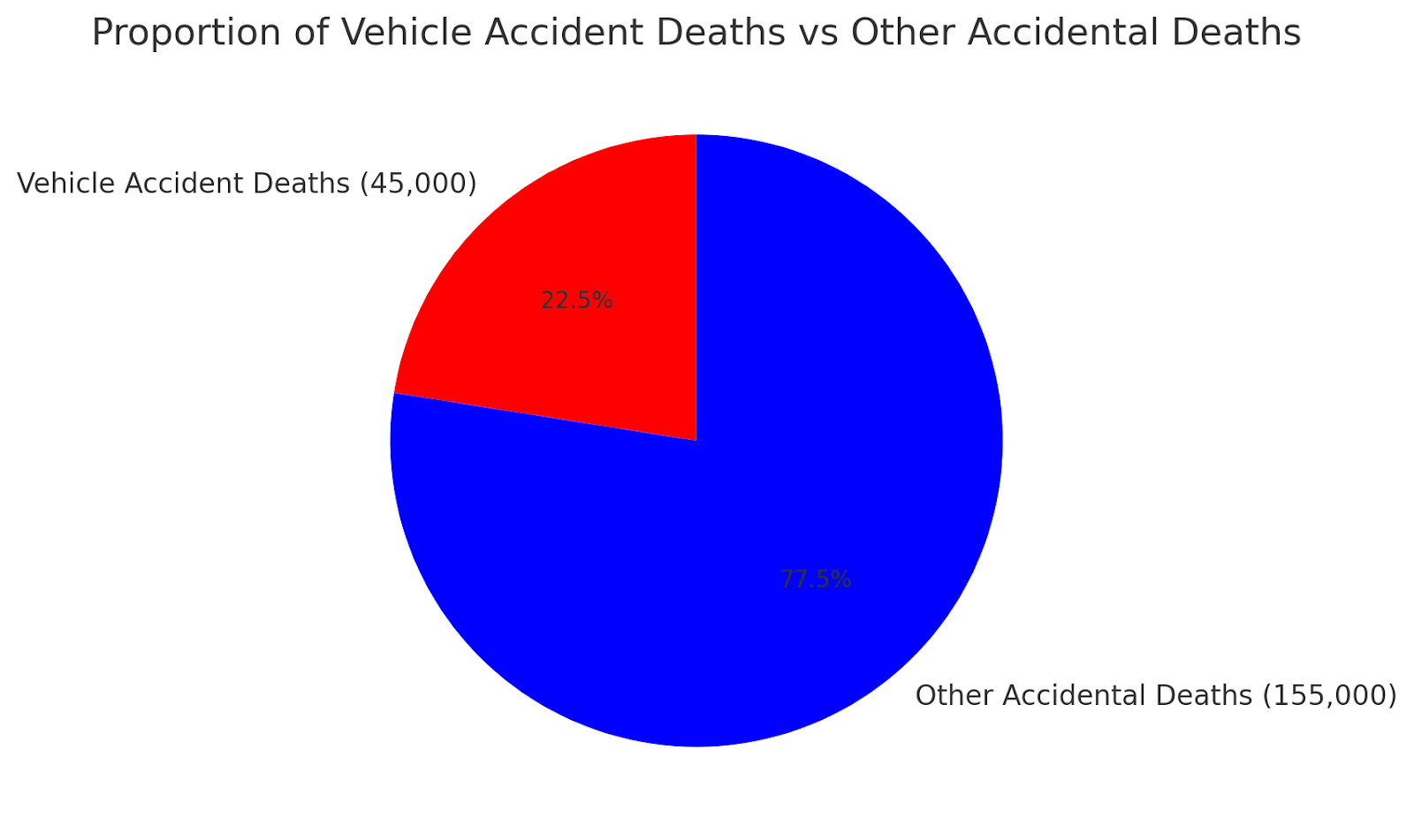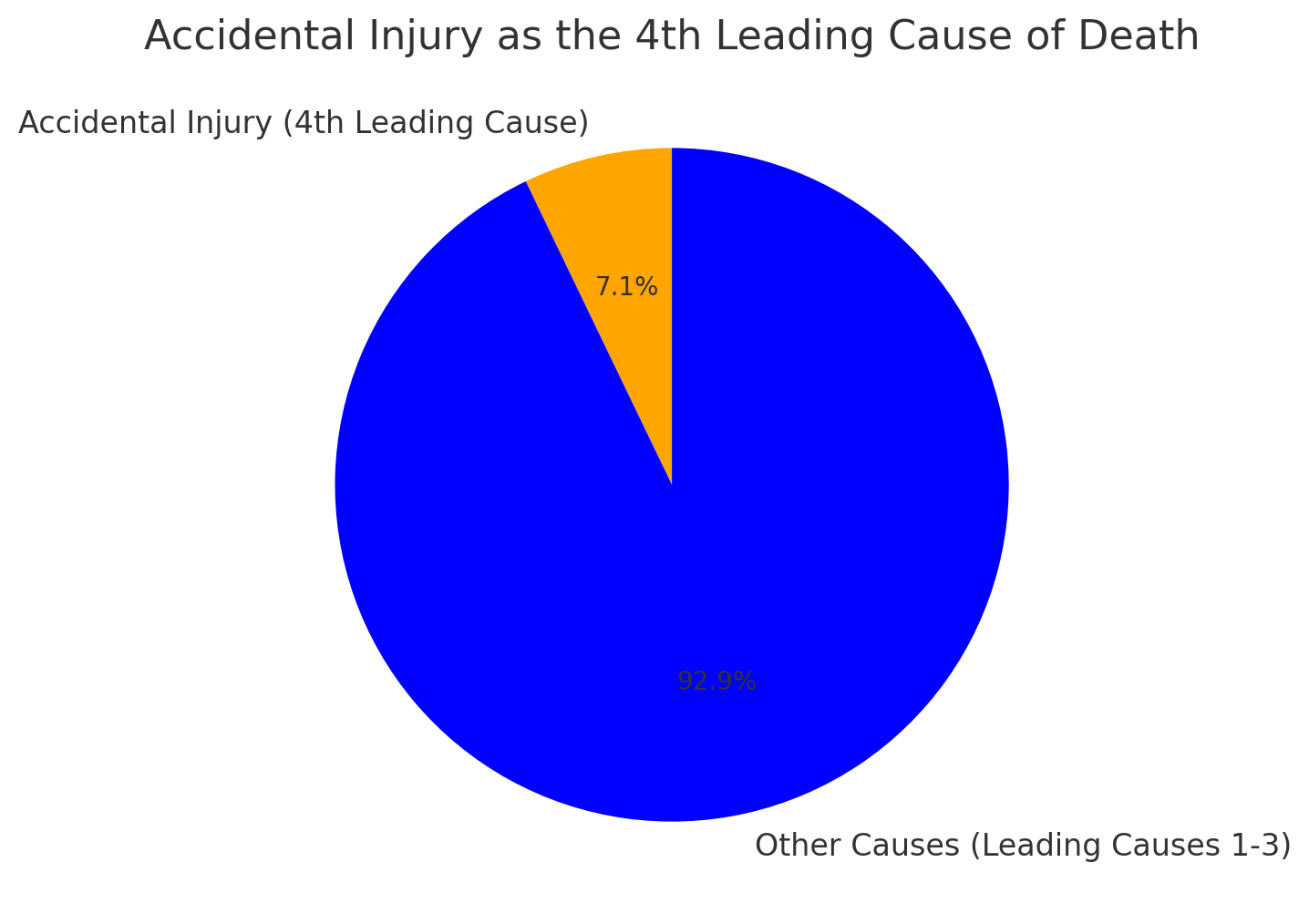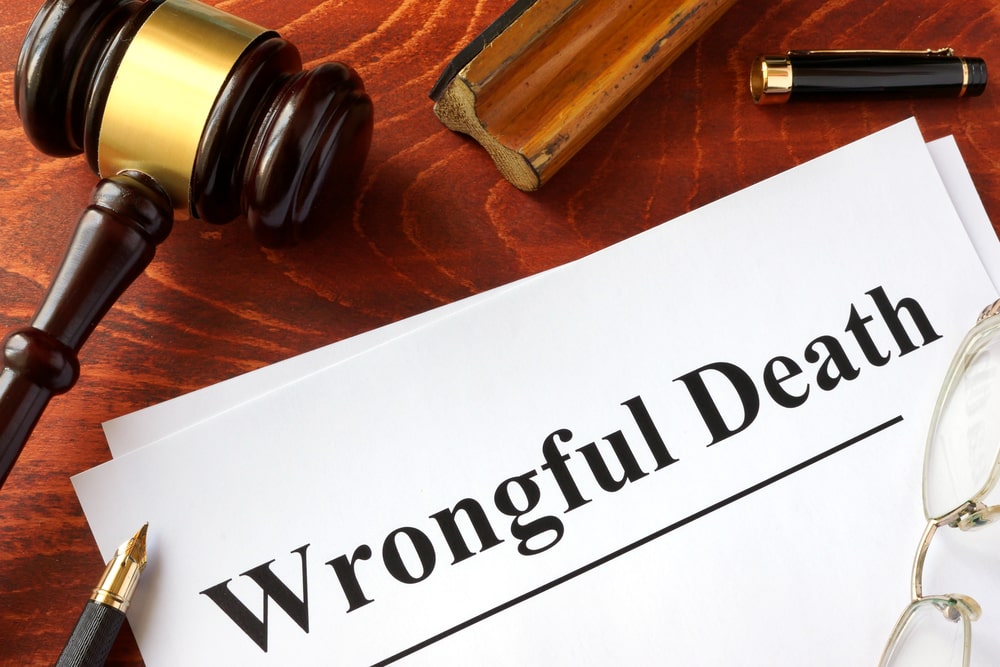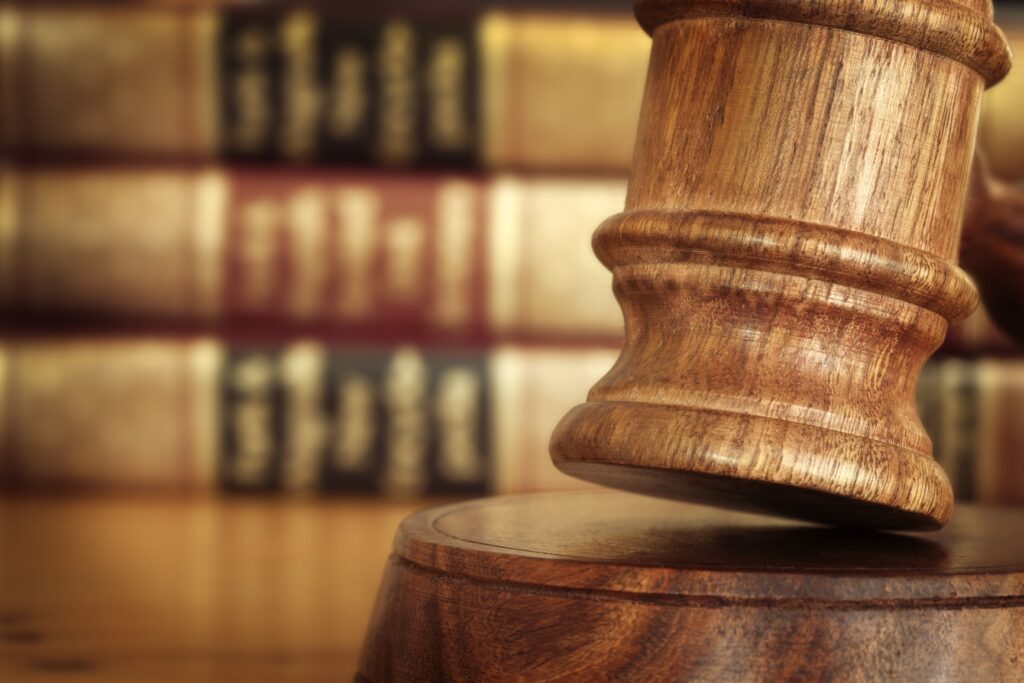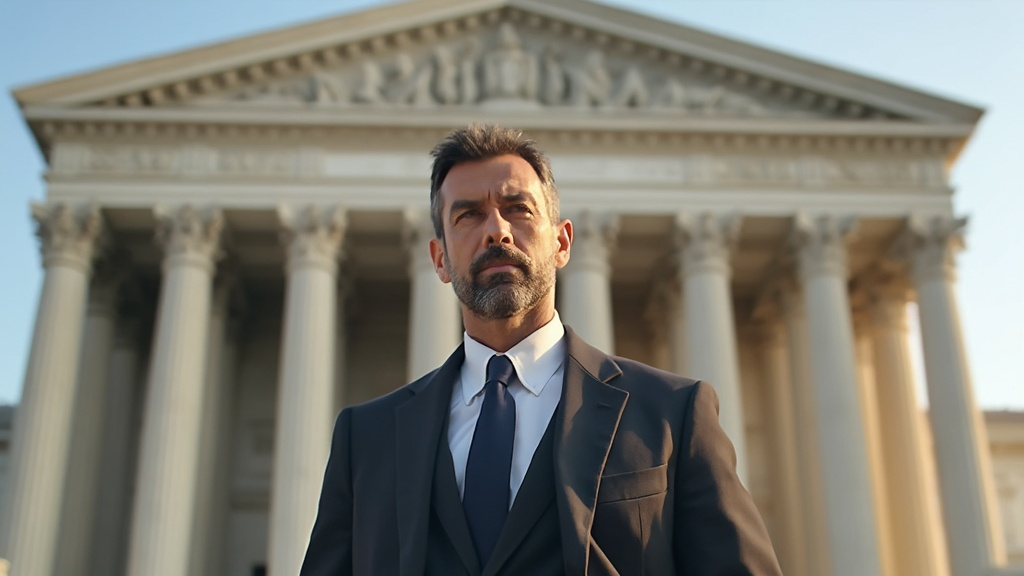
Professional Assistance With Your Wrongful Death Case
At The Law Firm of Frederick J. Brynn, P.C., our Washington, D.C. wrongful death lawyer understands that no amount of compensation can ever truly make up for the loss of a loved one. However, a wrongful death lawsuit can provide a measure of justice and financial relief for surviving family members grappling with unexpected expenses and emotional trauma. A wrongful death case is a civil action that seeks to hold a person or entity legally responsible for causing someone’s death due to negligence, intentional harm, or other wrongful acts. It allows the estate of the deceased person, or specific family members, to file a claim seeking damages such as medical expenses, funeral costs, lost income, and more. If your family is grappling with the loss of a loved one due to someone else’s negligence, our team is here to support you through the whole process. We understand the emotional weight of these cases and approach each one with the utmost care and respect. Get in touch with our attorneys when you’re ready to discuss next steps—call now for a free consultation.
Reasons To Hire A Wrongful Death Attorney
The emotional and financial toll of losing a loved one can have a lasting impact. This is where our wrongful death lawyer becomes invaluable. In these cases, it’s not just about seeking justice; it’s also about protecting and supporting the bereaved family during this challenging time. Our legal team is dedicated to providing compassionate and thorough representation to families facing these difficult circumstances.
A wrongful death claim is often complicated due to a number of factors. These personal injury laws are not just about proving negligence but also about quantifying the loss. This includes not only the financial support that the deceased would have provided but also the loss of companionship, emotional support, and other intangible factors that are harder to quantify. Our dedicated wrongful death attorney handles these challenges with sensitivity and precision so that every aspect of your loss is acknowledged and addressed in your claim.
The job of our lawyer is multifaceted. Our legal team has over 75 years of combined experience, and we’re skilled at providing clients the support that they need to get through their unimaginable loss and sudden legal hurdles. We handle the legalities, allowing families to focus on healing and rebuilding. From gathering evidence to negotiating with insurance companies and presenting your case in court, we are dedicated to seeking justice and fair compensation for our clients. When you’re ready to discuss your case, give our D.C. firm a call.
Eligibility For Filing Wrongful Death Claims
In Washington, D.C., the right to file a wrongful death lawsuit is generally restricted to the “personal representative” of the decedent’s estate, who is often a close family member like a spouse, parent, or child. This representative acts on behalf of the deceased’s surviving family members, such as a spouse, domestic partner, children, or even parents and siblings if there is no surviving spouse or child. The personal representative is typically appointed by the court and has the responsibility of seeking damages that would benefit the estate and the surviving relatives. It is vital to consult legal counsel familiar with the specific statutes and limitations in Washington, D.C., as the laws governing who can file a wrongful death claim may vary from those in other jurisdictions.
Building A Strong Claim
A thorough investigation and acute attention to detail are necessary to achieve the best outcome in a wrongful death claim. As wrongful death attorneys, we gather and analyze evidence to build a compelling case. This often involves interviewing witnesses, consulting experts, and investigating the circumstances of the incident. Our goal is to present a clear and convincing argument that highlights the full extent of your loss and the responsibility of the negligent party. In many wrongful death cases, multiple parties may bear some responsibility. Identifying and holding all responsible parties accountable is a key factor in making sure that justice is served. Our team has the resources and knowledge to untangle these scenarios and bring clarity to your claim.
Common Types Of Wrongful Death Cases
Wrongful death cases can arise from a multitude of scenarios where negligence or wrongful action leads to a fatal outcome. Common types include medical malpractice, where healthcare providers fail to meet the standard of care resulting in a patient’s death, automobile accidents caused by reckless or impaired driving, workplace incidents where an employer’s failure to maintain a safe environment leads to a fatality, defective products that cause death due to design or manufacturing flaws, and criminal acts such as homicide, where civil claims can be pursued in addition to criminal charges.
Less commonly, wrongful death lawsuits can stem from boating accidents, aviation disasters, or even premises liability, where a property owner’s negligence leads to a fatal accident. Each type of wrongful death case has its own unique set of legal considerations, and understanding these elements is imperative for achieving a successful outcome.
Wrongful Death Damages
In Washington, D.C., various types of damages can be recovered in a wrongful death lawsuit to compensate the estate and the surviving family members for their loss. There are many unexpected costs that come up after losing a loved one, and you have the right to seek financial recovery if your loss was the result of negligence. While the specifics can vary depending on individual circumstances and applicable laws, the general categories of damages that may be recoverable include economic damages, non-economic damages, punitive damages, and more.
Economic Damages
- Medical expenses, such as the costs of medical care the deceased incurred prior to death.
- Funeral and burial costs covering all expenses associated with laying the deceased to rest.
- Lost wages and benefits calculated by evaluating the loss of income and other benefits that the deceased would have earned if they lived.
Non-Economic Damages
- Emotional suffering compensation assigns a monetary value to the emotional trauma suffered by the surviving family members.
- Loss of consortium damages account for the loss of companionship, love, and moral support that the deceased provided.
- Loss of guidance and mentorship compensation is especially relevant for minors who have lost a parent. This covers the intangible benefits of guidance and nurturing.
Punitive Damages
- Egregious actions may incur additional damages. In cases where the defendant’s conduct is found to be particularly egregious, punitive damages may be awarded to punish the defendant and deter similar behavior in the future. Note that punitive damages are not always available in all wrongful death cases.
Interest
- Pre- and post-judgment interest on the awarded damages, depending on court rules and circumstances.
Attorney’s Fees And Legal Costs
- In certain cases, you may be able to recover the costs of legal representation, although this is not universally applicable.
It’s essential to consult with experienced legal counsel to understand what types of damages may be recoverable in your specific situation.
5 Potential Parties You Can Sue For Wrongful Death
A wrongful death case is a case where an individual’s death occurs due to negligence, recklessness or the deliberate acts of another person, business, or other entity. These claims allow the deceased’s beneficiaries or dependents to seek compensation for their losses. Identifying the responsible party or parties is a fundamental step in this legal process. It is helpful for clients to know these five primary entities that can often be held liable in wrongful death cases.
- Individuals. A common wrongful death case involves a person directly causing another person’s death, whether intentionally or not. This includes drivers in fatal car accidents, medical professionals in cases of medical malpractice, or assailants in homicides. In such scenarios, the individual’s behavior is scrutinized under the law to determine if it constituted negligence, recklessness, or intentional harm.
- Corporations And Businesses. Businesses or corporations can also be held liable when a person dies after using their services or products, or if a worker dies because of unsafe practices. This includes cases like defective products, hazardous work environments, or failure to provide adequate safety measures. Businesses carry the responsibility of certifying the safety of their products and services, and their failure in this regard can lead to wrongful death claims.
- Government Entities. Government bodies can be sued for wrongful death in certain circumstances, particularly when the death results from the actions or negligence of a government employee or agency. Common examples involve accidents caused by mistakes by police misconduct or faulty construction projects overseen by the government. However, suing a government entity is complicated because of sovereign immunity laws, which sometimes protect these entities from legal action.
- Medical Institutions. Hospitals and other healthcare facilities can be held accountable for wrongful death due to medical malpractice. Errors often include surgical errors, misdiagnosis, and substandard care provided by medical professionals. These institutions have a duty of care to their patients, and a breach of this duty can result in a viable wrongful death claim.
- Vehicle Manufacturers. Fatal accidents are often caused by vehicle defects, and in these cases, the manufacturer can be held liable. This encompasses defects in design, manufacturing, or failure to warn about potential risks. These cases often involve detailed investigations to establish the link between the defect and the accident.
Washington, D.C. Wrongful Death Infographic
DC Wrongful Death Statistics
According to the Centers for Disease Control and Prevention (CDC), more than 200,000 people are killed in the U.S. each year due to accidental injury. Accidental injuries are now considered the fourth leading cause of death in the country. Vehicle accidents are the most common cause of these fatalities, responsible for the deaths of more than 45,000 victims each year. If you have lost a loved one due to someone else’s negligence, you may be able to pursue legal action against the at-fault party to recover financial justice for your loss.
Wrongful Death FAQs
Our D.C. wrongful death lawyer understands that when a loved one passes away, the family will be left to grieve their loss, experiencing intense pain and a time of uncertainty. Unfortunately, the grief process can become even more difficult when coupled with someone else’s negligence or wrongful actions. Our experienced team is dedicated to providing compassionate guidance and unwavering advocacy to families working through these difficult times. These are five frequently asked questions related to wrongful death law that offer clarity and insight into the legal process.
What Evidence Is Needed To Support A Wrongful Death Claim?
In a wrongful death claim, evidence is influential in establishing liability and proving the extent of damages suffered by the surviving family members. Evidence typically includes medical records, accident reports, witness statements, expert testimony, and any documentation demonstrating the financial and emotional impact of the loss. This evidence helps to construct a compelling case that highlights the negligent actions of the responsible party and the resulting harm inflicted upon the deceased and their loved ones.
Can A Wrongful Death Case Be Settled Out Of Court?
Yes, a wrongful death case can be settled out of court through negotiation between the parties involved. Many wrongful death claims are resolved through settlement agreements, which offer a faster and less adversarial alternative to going to trial. Settlements allow both sides to reach a mutually acceptable resolution without the need for lengthy litigation. However, it’s vital to have experienced legal representation so that any settlement reached adequately compensates the family for their loss and protects their rights.
How Long Does It Take To Resolve A Wrongful Death Case?
The timeline for resolving a wrongful death case can vary depending on several factors, including the circumstances of the case, the willingness of the parties to negotiate, and the court’s schedule. Some cases may be resolved relatively quickly through settlement, while others may require more extensive litigation and can take several months or even years to reach a resolution. It’s essential to work with our experienced legal professionals who can provide realistic expectations and guide you through the legal process with patience and diligence.
What Role Does Insurance Play In Wrongful Death Cases?
Insurance often plays a significant role in wrongful death cases, particularly in cases involving motor vehicle accidents, medical malpractice, or premises liability. In many instances, the at-fault party’s insurance coverage may provide compensation to the surviving family members for their losses. However, insurance companies are primarily concerned with minimizing their financial liability and may attempt to offer low settlements or deny valid claims altogether. To achieve full and fair compensation, it’s important to work with our experienced legal professional who can help make insurance companies fulfill their obligations.
What Are The Damages I Can Recover From Wrongful Death?
In Washington, D.C., damages for wrongful death can be categorized into economic and non-economic types. Economic damages may include medical expenses incurred before death, funeral and burial costs, and lost wages and benefits that the deceased would have contributed to the family. Non-economic damages can cover emotional suffering, loss of companionship, and loss of guidance and mentorship. In some instances where the defendant’s conduct is exceptionally reprehensible, punitive damages may also be awarded to punish and deter similar behavior. Time-sensitive statutes of limitations apply to these claims, making it imperative to consult with our experienced legal professionals for a thorough understanding of what you may be entitled to recover.
What Are The Elements Of Damages In Wrongful Death?
In a wrongful death lawsuit, the elements of damages are generally divided into economic and non-economic categories. Economic damages are tangible losses such as medical expenses incurred before death, funeral and burial costs, and lost wages and benefits the deceased would have provided. Non-economic damages encompass intangible losses like emotional suffering, loss of companionship, and loss of guidance or mentorship for surviving minors. In certain egregious cases, punitive damages may also be awarded to punish the defendant and deter similar behavior. Each of these elements aims to provide some form of compensation to the deceased’s estate and surviving family members for their irreplaceable loss.
What Is The Statute Of Limitations For Wrongful Death In Washington, D.C.?
In Washington, D.C., the statute of limitations for filing a wrongful death lawsuit is generally two years from the date of the decedent’s death. This means that the personal representative of the deceased person’s estate has a limited window of time to initiate legal proceedings. Failure to file a claim within these two years typically results in the forfeiture of the right to seek compensation for the wrongful death.
Under personal injury law, there are some exceptional circumstances under which this time limit may be extended or paused, such as when the defendant leaves the jurisdiction or when the personal representative is a minor. However, these exceptions are rare and should not be relied upon without consulting experienced legal counsel.
What’s The Difference Between A Wrongful Death Claim And Survival Actions Claim?
The key difference between survival actions and wrongful death claims lies in who the claim is for and what damages are being sought.
A wrongful death claim is filed by the deceased person’s family members or dependents to recover compensation for their own losses resulting from the death. These losses can include funeral expenses, loss of financial support, and emotional damages like loss of companionship or guidance. A survival action, on the other hand, is brought on behalf of the deceased person’s estate and seeks damages for the losses the deceased experienced before their death. This can include medical expenses, lost wages, and pain and suffering endured between the time of injury and death.
Both claims are often pursued together to seek full compensation for the family and the estate. Our experienced personal injury attorneys can help determine the appropriate claims to file based on the circumstances of the case.
Washington DC Wrongful Death Glossary
At The Law Firm of Frederick J. Brynn, P.C., we understand the immense emotional and financial toll of losing a loved one due to someone else’s actions. Our Washington DC wrongful death lawyer is here to provide compassionate guidance and experienced representation to help you seek justice during this difficult time. Below are key legal terms and concepts you may encounter in wrongful death cases.
Personal Representative
The personal representative is the individual legally authorized to act on behalf of the deceased’s estate. In Washington, D.C., this person is often appointed by the court and may be a close family member, such as a spouse, parent, or adult child.
This representative is responsible for filing wrongful death claims, managing the legal process, and ensuring any compensation is distributed to the appropriate beneficiaries. Our firm works closely with personal representatives to simplify the process and ensure the claim is as thorough as possible.
Loss Of Consortium
Loss of consortium refers to the emotional, social, and relational support that surviving family members lose due to the death of a loved one. This includes the loss of companionship, love, and guidance that the deceased would have provided.
For example, a spouse can claim loss of consortium for the absence of their partner’s companionship and support. Similarly, children may seek compensation for the loss of parental guidance and nurturing. This intangible loss is a critical aspect of wrongful death cases and underscores the profound emotional impact of such tragedies.
Survival Action
A survival action is a separate legal claim filed on behalf of the deceased person’s estate. It seeks to recover compensation for the pain, suffering, and financial losses the deceased endured before passing away.
For instance, if someone suffered severe injuries in an accident and later died, the survival action would address the medical expenses and suffering experienced before death. This claim complements a wrongful death lawsuit, so that all aspects of the deceased’s experience are accounted for.
Punitive Measures
In some wrongful death cases, the court may award punitive measures (commonly called punitive damages) to penalize the at-fault party for particularly reckless or intentional conduct. These are awarded in addition to compensation for financial or emotional losses. For example, if a fatality results from a drunk driver with a history of DUI convictions, punitive measures may be pursued to discourage similar behavior in the future. While not applicable in every case, these measures emphasize accountability for egregious actions.
Multiple Responsible Parties
In wrongful death cases, there may be multiple responsible parties who share liability for the loss. This can include individuals, corporations, or government entities whose actions or failures contributed to the fatality.
For instance, in a workplace accident, responsibility may extend to the employer, equipment manufacturer, or third-party contractors. Identifying all liable parties is essential to building a comprehensive claim, and our legal team thoroughly investigates each case to address every angle of responsibility.
Comparative Negligence In Wrongful Death Cases
Washington, D.C., follows strict comparative negligence rules, which can affect the outcome of wrongful death claims. If the deceased is found to have contributed even slightly to the circumstances that led to their death, it may impact the ability of their family to recover compensation.
For example, if a pedestrian struck by a vehicle was jaywalking at the time of the accident, the defense may argue that this partial fault reduces or eliminates their liability. Our legal team is skilled at countering such arguments, focusing on building strong cases that highlight the primary responsibility of the defendant.
The Law Firm of Frederick J. Brynn, P.C., Washington, D.C. Wrongful Death Attorney
922 Pennsylvania Ave. SE #100, Washington, DC 20003
Contact Our Firm Today
At The Law Firm of Frederick J. Brynn, P.C., we are committed to providing compassionate support and tenacious advocacy to families seeking justice for their loved ones in wrongful death cases. Our attorneys, Stephen F. Brennwald and Frederick J. Brynn, are passionate about helping people during life’s most challenging chapters. If you have lost a family member due to someone else’s negligence or misconduct, we’re here to help. We offer 24/7 phone answering. Contact us today for a confidential consultation to discuss your legal options and take the first step toward securing the compensation and accountability you deserve.

